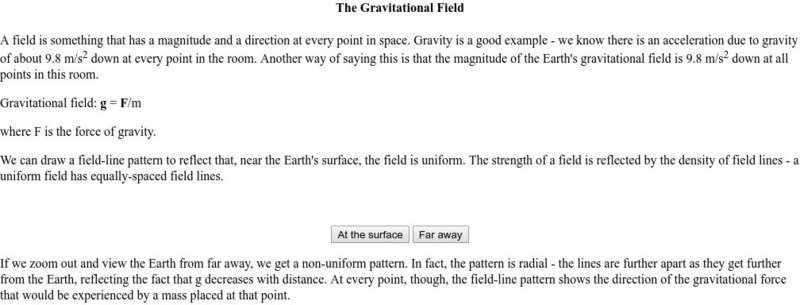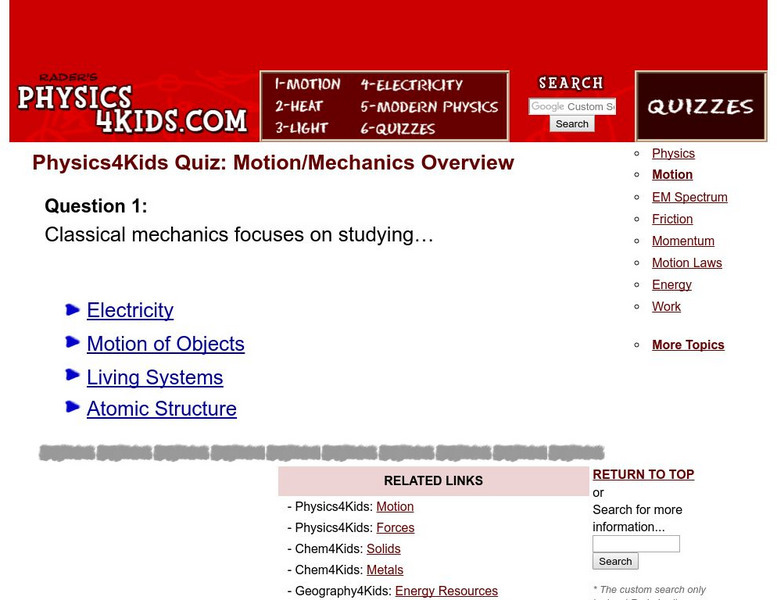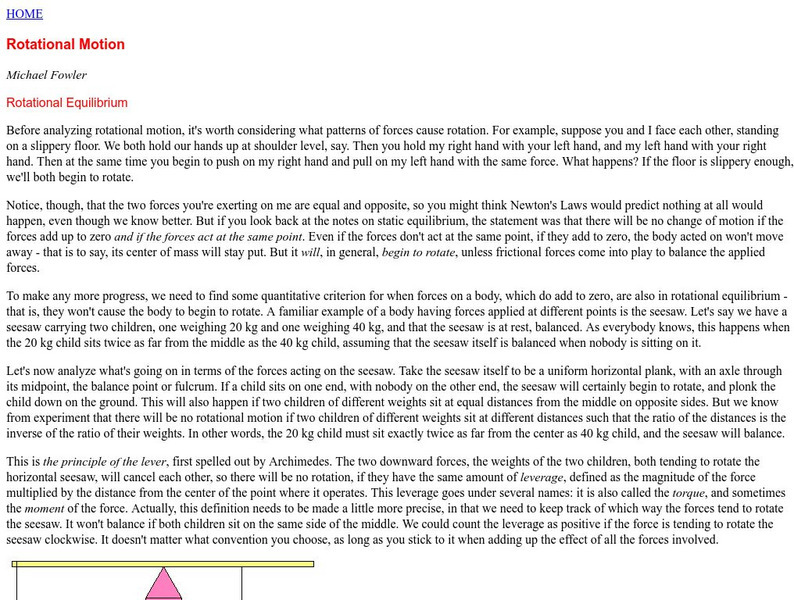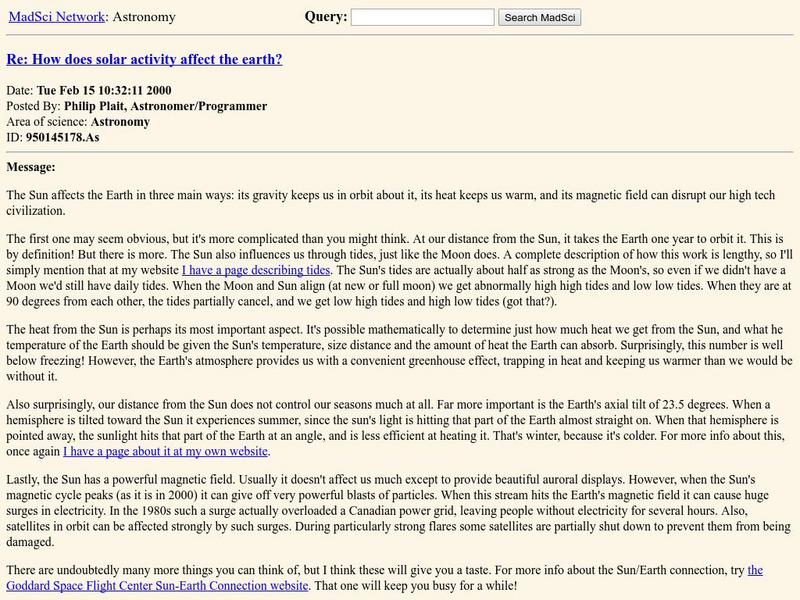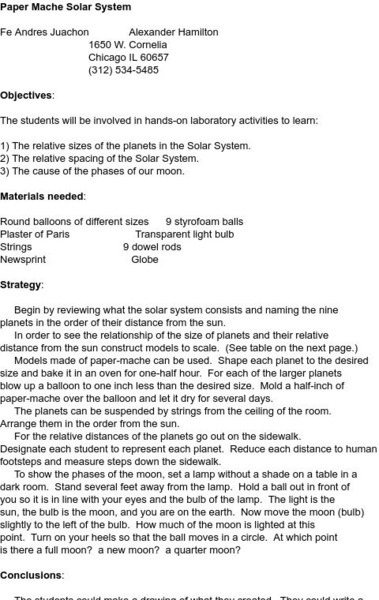Bill Nye
Bill Nye: Penny Droplets
Try this at-home science experiment to learn about the forces of gravity, cohesion, and adhesion.
Exploratorium
Exploratorium: Snacks
Exploratorium's snacks aren't edible, but they are good! Use your science skills to discover gravity, learn about biology, do fun experiments.
Physics Classroom
The Physics Classroom: Skydiving
The Physics Classroom offers this animation depicting the forces acting upon a falling skydiver.
Khan Academy
Khan Academy: Newton's Law of Gravitation Review
Review the key concepts, equations, and skills for Newton's law of gravity, including how to find the gravitational field strength.
University of St. Andrews (UK)
University of St. Andrews: Orbits and Gravitation
A page describing the physics, mathematics, and historical figures associated with planetary motion, satellite motion, and universal gravitation.
Boston University
Boston University: The Gravitational Field
Defines what a gravitational field is, its value, and how to calculate it. Field-line patterns are also drawn and explained.
PBS
Pbs Learning Media: Spin a Spiral Galaxy
This interactive activity from NOVA Online lets you spin a spiral galaxy, including our own Milky Way. It demonstrates that what you can learn from visible light observations of a galaxy is largely determined by the angle from which you...
Physics4kids
Physics 4 Kids: Motion/mechanics Overview Quiz
Take this ten question multiple choice quiz on motion and mechanics.
NASA
Nasa Star Child: Planet Hop
Figure out your age and your weight on all the planets in the solar system using the formulas given here. Then type them into the correct place, and let the computer check to see if you are correct.
University of Virginia
University of Virginia: Rotational Motion
A page describing rotational equilibrium and non-equilibrium situations. Includes graphics, equations, and many examples.
Science4Fun
Science4 Fun: Mass and Weight
What is mass? What is weight? Illustrated discussion of mass and weight including how they are measured.
NASA
Nasa: Rockets Educator Guide: Newton Car
This lesson gives students direction on how to experiment using gravity and force. Students will make a wooden car and use different forces to make the car propel.
TeachEngineering
Teach Engineering: Dams
Through eight lessons, students are introduced to many facets of dams, including their basic components, the common types (all designed to resist strong forces), their primary benefits (electricity generation, water supply, flood...
TeachEngineering
Teach Engineering: The Claw
Students learn about gear ratios and power by operating toy mechanical cranes of differing gear ratios. They attempt to pick up objects with various masses to witness how much power must be applied to the system to oppose the force of...
NASA
Nasa: Kepler's Third Law
This site from NASA states Kepler's third law of motion and extends it to develop an equation for the velocity of an orbiting planet.
MadSci Network
Mad Scientist: Why High Tide Away From the Moon or Sun?
An excellent and thorough answer to the often asked question about high tide "bulges" on the side of Earth facing away from the Moon or Sun.
Science and Mathematics Initiative for Learning Enhancement (SMILE)
Smile: Paper Mache Solar System
This site from the Illinois Institute of Technology provides a set of directions for the creation of a solar system model out of paper mache. Includes orbital distances and planet diameters for the nine planets. Great idea for a student...
Discovery Education
Discovery Education: Physical Science
The Discovery Channel provides numerous lesson plans dealing with the physical sciences. Content is organized by grade level, but all lesson plans include suggestions for adaptations for older or younger audiences.
Physics Classroom
The Physics Classroom: Kepler's Second Law
Kepler's second law of planetary motion is stated and explained. An animation of the orbit of a planet and an accompanying graphic assists in explaining the meaning of the law of equal areas.
Science Fun for Everyone
Science Fun: Egg Drop
Learn about inertia with this egg drop science experiment. Try not to crack too many eggs!
Other
Gyroscopes.org: Gyrosopic Propulsion
This site explores the speculative concept of gyroscope propulsion, including a description of force precessed gyroscopes. This research could theoretically lead to the development of new engines and thrust devices.
Science Struck
Science Struck: A Comprehensive List of All the Physics Formulas
Provides a long list of physics formulas for easy reference.
Concord Consortium
The Concord Consortium: Molecular Workbench: When a Ladder Falls
View an animation of a ladder falling due to the force of gravity.
Encyclopedia of Earth
Encyclopedia of Earth: Solar Radiation
Almost all of the energy that drives the various systems (climate systems, ecosystems, hydrologic systems, etc.) found on the Earth originates from the sun. Solar energy is created at the core of the sun when hydrogen atoms are fused...




